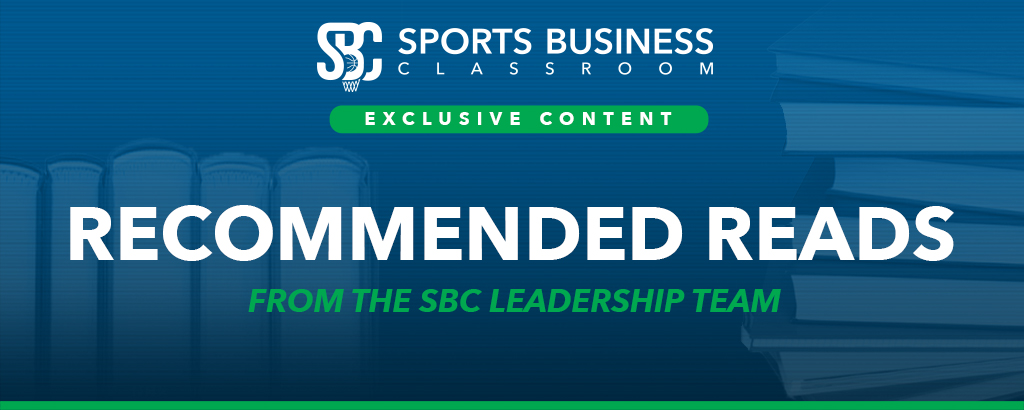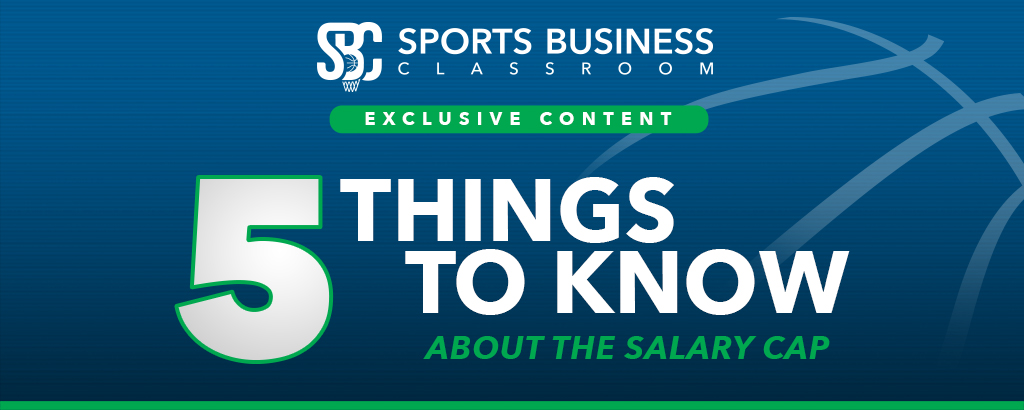
We received a great question from one of our incoming 2017 students, Justin Scheuner (edited here for brevity): “I was wondering if there is anything I can be doing now/ahead of Sports Business Classroom in order to better prepare myself for what I will learn? Books I can read, people I can reach out to, volunteer opportunities I should look into, etc.?”
There are no firm prerequisites for the curriculum at Sports Business Classroom, although we do our best to select students whose education, experience and aptitude will allow them to hit the ground running, get the most out of the program, and successfully apply what they learned to their future goals. Justin’s question on books was especially intriguing. We reached out to the SBC leadership team to ask, “If you could recommend one book for student to read before coming to SBC, what book would it be and why?” As expected, we got a lot of great answers, which are especially notable for their diversity. Here’s what the SBC leaders had to say:
BEN ALAMAR – Program Lead: Analytics
Basketball on Paper, by Dean Oliver
The book that I recommend to every student and NBA front office hopeful I speak to is Basketball on Paper by Dean Oliver. This book is the cornerstone of basketball analytics. When it was published, it was ground breaking both for its new perspective on basketball, and for its accessibility despite the mathematics involved. Now it serves as a clear explanation of how analysts began thinking analytics about basketball and how that style of thinking can lead to new insights. It is nearly impossible to truly innovate in basketball without understanding what has come before, and in basketball analytics, that starts with Dean’s book.
DAVID ALDRIDGE – Program Lead: TV, Online and In-Arena Broadcast
All the President’s Men, by Carl Bernstein and Bob Woodward
I was, almost certainly, the only 8-year-old who watched almost all of the Watergate hearings from start to finish. The idea that a president could be removed from office by other people in the government fascinated me, and the two men most responsible for that happening were Bob Woodward and Carl Bernstein. Their account of how they gradually realized the scope of Watergate–and their honest recapping of their own mistakes as reporters as they doggedly pursued the story, wherever it led–makes All The President’s Men a how-to of investigative journalism. I still have my mom’s original paperback copy, though the spine has cracked and the book is in pieces after my dozens of re-readings.
LARRY COON – General Manager
The Demon-Haunted World: Science as a Candle in the Dark, by Carl Sagan
This is neither a sports book nor a business book, so it might seem like an odd choice for a sports business class. Still, it’s the number-one go-to book on my bookshelf, and one I re-read every five years or so. It’s ostensibly a book about science, but it’s really a book about thinking, since the scientific method itself is merely an application of good critical thinking skills. It’s a treatise on how to evaluate existential claims, and a toolkit for separating the real from the imaginary. This book will teach you how to approach claims, think about them rationally, and avoid the natural cognitive pitfalls that come with being human – skills that can be applied to all aspects of life.
Sagan said it best: “One of the reasons for its success is that science has a built-in, error-correcting machinery at its very heart. Some may consider this an overbroad characterization, but to me every time we exercise self-criticism, every time we test our ideas against the outside world, we are doing science. When we are self-indulgent and uncritical, when we confuse hopes and facts, we slide into pseudoscience and superstition.”
NATE DUNCAN – Instructor, League Salary Cap
The Signal and the Noise, by Nate Silver
I’d go with Nate Silver’s The Signal and the Noise. In 2010, Silver penned one of the lines I try to remember on a daily basis: “One of life’s little ironies is that, over the long run, people who are willing to admit they could be wrong turn out to be wrong a lot less often than people who aren’t.” The Signal and the Noise expands on that quote to examine how we make predictions and how we can improve our processes, by being smart, critical, and most of all humble.
JEFF FELLENZER – Lead: Networking, Resume Writing and Interviewing
Wooden: A Lifetime of Observations and Reflections On and Off the Court, by John Wooden with Steve Jamison
The closest thing I have to a textbook in my “Sports, Business, Media” and “Sports and Media Technology” classes at USC is this small gem, a still-relevant, robust collection of Coach Wooden’s best maxims, stories and anecdotes. The beauty of what I refer to simply as “the blue book,” with its UCLA blue (or yellow) cover, is that you can open it up to virtually any page, start reading and find enduring wisdom. It’s all part of what became a remarkable 99-year journey for this modest, humble, fiercely competitive man who grew up on a farm in Indiana, became an All-America basketball player at Purdue, then embarked on a 27-year career as head coach at UCLA that included a mind-blowing 10 national championships (seven in a row) and recognition by many as the greatest coach in sports history.
I was honored to have known Coach Wooden as a close friend, having made many trips to what I called the “Mecca on Margate,” his modest condominium on Margate Street in the Los Angeles suburb of Encino. So I have a segment in my classes to honor his memory (he was a guest in my class on three different, life-changing occasions, still razor sharp in his 90s) called our “Weekly Wooden,” in which I pick out two or three observations to discuss with my students, all of whom only know John Wooden by what they’ve read, his world-famous Pyramid of Success or via old game footage. Three of my favorite Woodenisms: 1) Be more concerned with your character than your reputation; character is what you really are, reputation is what people say you are. 2) Failing to prepare is preparing to fail. 3) NO ONE is an overachiever. How can you rise above your level of competency?
WARREN LeGARIE – President, Las Vegas Summer League
Swim with the Sharks without being Eaten Alive, by Harvey B., Mackay
The one book that I would highly recommend that our students read, either before, but certainly after experiencing our SBC program is “Swim with the Sharks without being Eaten Alive” by Harvey B. Mackay. No matter how much knowledge you gain from your classroom and/or real life experiences, unless you’re able to articulate those experiences and knowledge and apply them to real life interviews that will determine your work future, you’ll just be a frustrated dreamer. Having ideas and/or a vision of your future is one thing, selling that vision will ultimately determine how far you can go with it by having others wanting you on their team. This book, in my opinion, can help you better understand the tough questions you need to ask about your life, your calling and how to better convince others to give you that opportunity or first professional break we all seek when we first started out on this journey.
TRACY WEISSENBERG – Program Lead: Social Media, Public Relations and Digital Branding
Louder than Words, by Todd Henry
One of the first steps in utilizing social media is to define a voice. Brands aim to ensure the voice of their channels reflects their business and values in addition to engaging the audience. On platforms that are so interactive, a strong, recognizable and authentic voice personifies a company, enabling it to connect with consumers in a personal and deliberate manner. That’s powerful. So what about when the voice we’re talking about is your own? Henry explores the power of one’s voice, including how to maximize its potential, think about it strategically and use it to carve out a role that is personally fulfilling. Henry has many tips and fascinating anecdotes that focus not only on proven success, but more importantly, the process and the path. It’s a book you’ll want to read with a highlighter nearby.


Leave A Comment